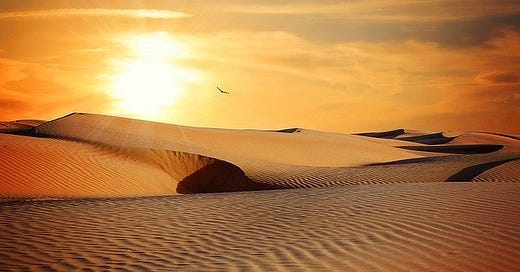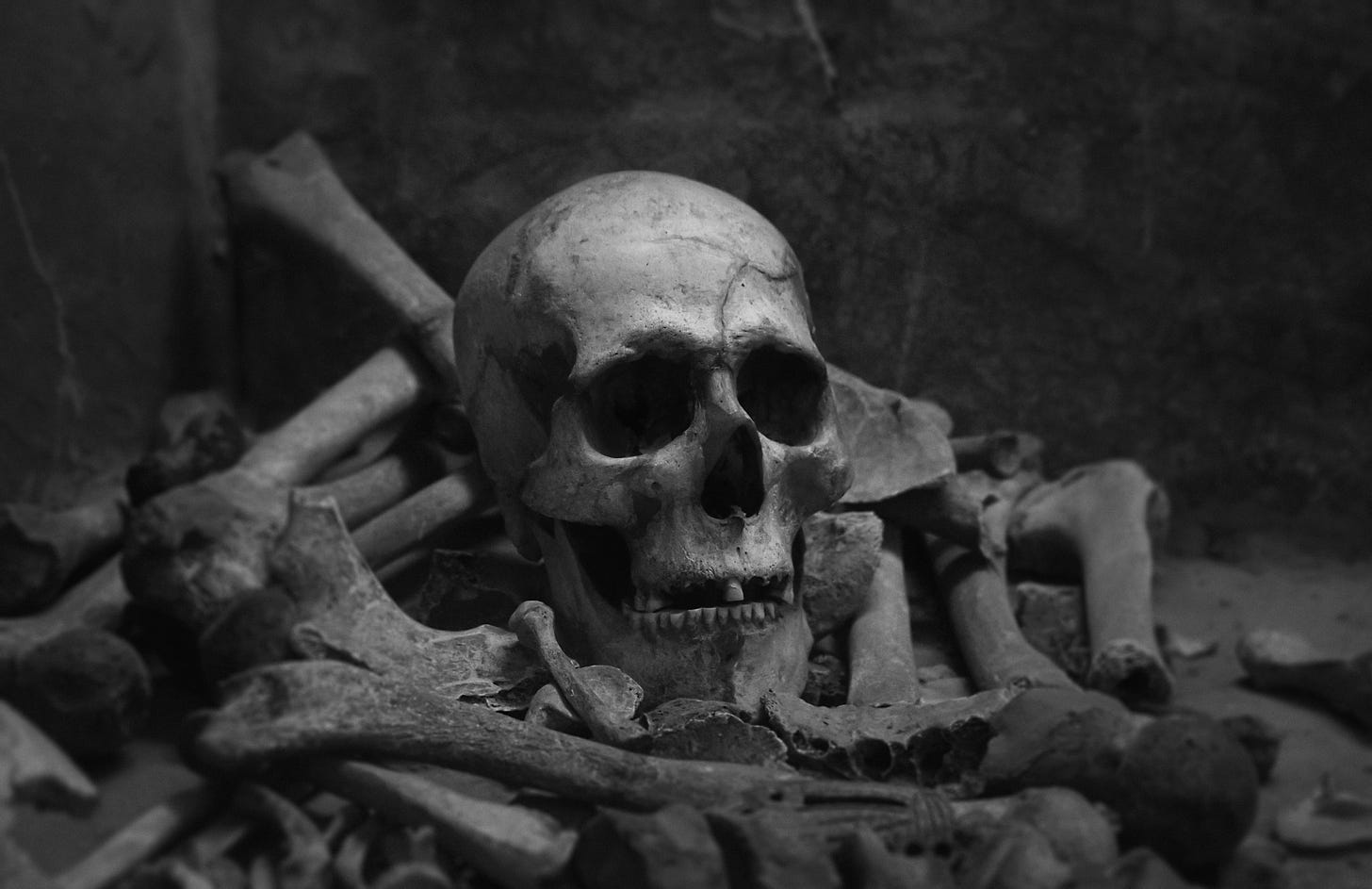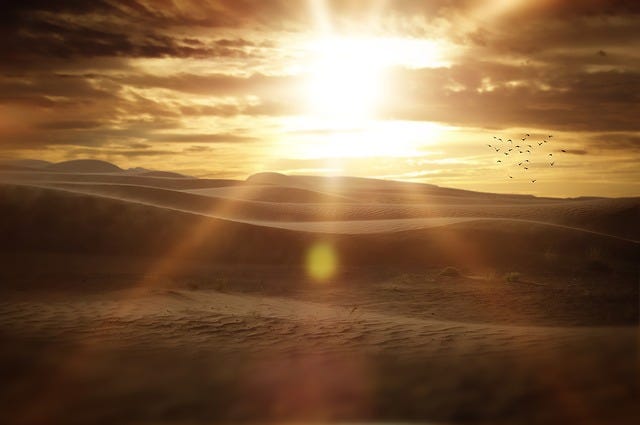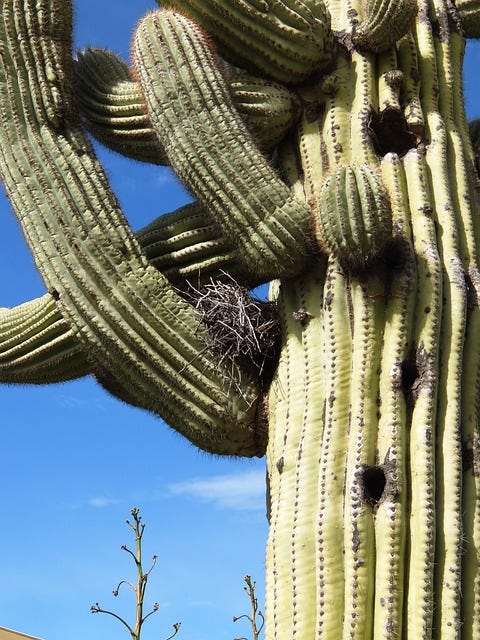The Hanged Man: Part 7: Beltane
Post #67: In which our place in the world cries out for us ...
(If you are a new subscriber, you might want to start at the beginning of The Hanged Man. If you prefer to read Part 7 in its entirety, go here. For the next serial post, go here.)
“Talk about what home means,” Maria invited Nephthys, confident she need not go into a lengthy preface.
The three of them sat together by the fire. The air coming in the cave mouth felt chilly. Nephthys leaned over and picked a bone up off the sandy floor of the cave. She turned it over in her hands.
“Jackrabbit, I think.” She handed it to Kunik.
Maria watched him close his eyes and run his fingertips along the length of the bone, as though feeling for a pattern. He turned it over in his hands, then ran it up and down the underside of his forearm. He opened his eyes and handed the bone back to Nephthys.
“Yes, I think so.”
“Life sleeps in this bone like a rabbit in a burrow,” said Nephthys. “If I call its name it will wake, and stretch and put on its clothes, come out into the world. The bone is home. The burrow is home. The world is home.”
“Layers,” said Maria.
“So, home is a place outside but also a place inside?” asked Kunik.
Nephthys smiled. “To call a life you must know its name. I couldn’t call a jackrabbit from a desert pig. I couldn’t call a desert pig from an armadillo.”
“You must know what it truly is,” said Kunik slowly.
“That’s the part about knowing who we are. Who we truly are,” said Maria.
Nephthys continued, “In order to bring something into life you need to know it. You need to love it. You must understand why it wants to live — why it needs to live. You must find out why life needs it.”
“You must know what it’s for!” said Maria.
Nephthys clapped. “The last rule is someone outside the life must call it into being. It can’t call itself.”
“It’s like weaving,” said Maria. “Each part of the pattern is a piece of something bigger. Each color and texture has meaning by itself and even more meaning in the context of the whole. It’s all meant to be connected, and some hand must do the weaving.”
She watched Kunik turning this over in his mind the way he’d turned the bone over in his hands. “So, there are many ways to look at home. It might be external. It might be internal. It might be in a larger context of connection or community.”
“But it’s not broken into pieces like that, Kunik,” said Maria. “It’s all of those woven together. It’s who we truly are, what we’re for, and our connection to others. You and I have worked on the first two. Now comes the third.”
She turned her gaze on Nephthys. “But I still don’t know what to do next. How do we find the community we want?”
“Oh, it doesn’t matter,” said Nephthys, smiling. “Whatever you’re looking for is also looking for you.”
Maria sent a quizzical glance to Kunik, whose placid round face looked serene in the firelight. “Interesting,” he said, without further explanation.
“You’ll find your way,” said Nephthys imperturbably. “But I know the first step.”
“What?” asked Maria.
“The bones are clean.”
The next morning, they carefully gathered the dry, smooth bones off the ant mound. Nephthys laid the desiccated body of a bird with a few feathers and strips of tissue still attached in their place. They hauled the bones up to the cave and heaped them on the floor.
Nephthys skimmed around the cave, packing bundles. “Kunik is going to play with me now.” She tossed him a hide bag. “Let’s take some jerky and the water skins,” she directed him, nodding at a ledge of rock. “Maria is staying here.”
Maria thought about being alone in the sunbaked silence of the red desert, nights and days slowly revolving around her. Alone with the bones of her murdered sons, her memories, her questions and her fears. “Don’t leave me,” she said, feeling like a child.
“You’ll be safe. We’ll come back.” Nephthys looked her in the eye and Maria glimpsed an ancient being. “Call out of the bones the life they’re waiting for. Call your life to you. Call yourself home.”
She turned away, tossed a heavy bundle to Kunik as though it weighed nothing, said “Byeee, Maria!” and disappeared out the cave entrance. Kunik turned and smiled at Maria reassuringly before he stepped down onto the steep path to the bottom of the canyon.
Maria took the four brown eyes from their resting place in a pouch between her breasts and laid them in a row on a flat stone that ringed the fire pit. They were open. She settled herself onto the clean, dry sand, put her hands in her lap, and allowed everything to drain away.
Many times in her life and death and this new life she’d been alone. Never had she been as naked with herself as she was now. Time made a flexible skeleton out of minutes, clothed itself in hours and slithered out into the sun to find a warm rock and bask. Maria knelt by the pile of bones and caressed them with her hands. She removed her clothes. She released her hair and it swept over her breasts, her shoulders, her arms and hands and what remained of her children in a raven sheet. She wept and tears jeweled her skin and glittered among the bones. She crawled, naked, around the pile, sand cool and gritty under her tender knees. She spread out the white sculptured bones, handling each one, and then piled them up, stacking, fitting them together, sorting by size. She rubbed them over her body, under her arms, between her legs. They felt cool and hard against her nipples. She pressed them against her cheeks, her inner thighs. She licked them. She squatted over an iron pot and urinated and dipped the bones in her urine, rubbing them dry with handfuls of sand, polishing, tending.
There was day. There was night. There was hot air. There was cool air. She slept among the bones, holding them to her chest like an armful of white flowers, nestling them safe between her breasts and legs. She tangled them in her hair and then untangled them, using delicate finger bones as combs. She wept, and slept, woke, wept again. She spat on the bones, massaged saliva against smooth planes and curves, scoured them with sand. She built a fire and watched light play over the framework of her children’s bodies.
She laid out memories and fantasies of her lover, Juan, on the cave floor among the bones, the way she’d laid out the eyes. She draped herself on a bed of bones and ran her hands down her body, shuddering at her own touch, pinching, caressing, releasing her flesh from its cold solitary prison of self-hatred. She called up the memory of his breath, smudged with the smoky liquor he liked to drink that made his eyes warm and his flesh bone wrapped in velvet. She allowed her body the memory of his lips, his hard male buttocks, his masterful hands.
In her dreams her three beloved male creatures, warm-fleshed, humid with breath and sweat, came to her. They rolled in her arms, greedy toothless mouths sucking at one breast while carefully restrained teeth teased the other. They trailed their scent across her lips, her hands, her body. They painted her with their hair and broke her heart with the familiar arch of an eyebrow. Over and over, she counted fingers and toes, nuzzled hidden places, danced a woman’s loving dance over their landscapes. They giggled and murmured, whispered and groaned in the final moment of climax, the bones, the memories, the children, the man.
She fingered the bones like beads, shuffled them like a pack of cards, laid them out and shuffled them again, seeking a different message. She threw them with a clatter and read their patterns by firelight, throwing again and again, searching for different meanings. Memories clinked and clicked together in her mind, inexorable, encased within a hard, white husk of that which does not die. The world of bone. The world of flesh. Worlds layered one over another. Worlds between worlds, folded, hidden, one supporting the other. Dreams merged with waking and she dissected through flesh in search of bone, found life in bone, called it forth, and reclothed it with flesh to be dissected through again. Her tears, her saliva, her urine, sank into the sand, and the bones of her beloved rested on the bones of rocks, and her body rested on both while the two pairs of brown eyes watched, one pair like dark chocolate and the other like light glinting on dark water.
In that timeless place of bone and sand, Maria discovered love again.
CHAPTER 26
A winged shadow disturbed the sunbathing snake of time and it slithered back into the red desert’s navel, flesh falling away into hours, flexible bones disassembling and reassembling into minutes. Maria washed her body and her hair, collecting water from the cool trickle that came into the cave. She shook out her clothes, lying like discarded ghosts on the sandy floor, and put them on. She made a neat pile of the bones. She ate and drank, replenished the wood pile after a brief walk in the cooling evening. She used a broom leaning against the wall to sweep the sand smooth, picked up the eyes and put her lips to them where they lay in her palm. “Sleep,” she whispered. “I’ll take care of you.” The eyes closed and she returned them to the bag between her breasts, cinching it carefully at its neck.
The first tentative stars gleamed in the sky when she saw the figures of Nephthys and Kunik coming down the twisting canyon bottom. She sat quietly on the threshold, watching them as they climbed toward her. They stopped in front of her and the three of them looked at one another. Maria reached out a hand to each of them.
“I know what to do,” she said, “and I need help.”
KUNIK
The evening Nephthys and Kunik returned to the cave, Kunik recognized and did not recognize his friend Maria. The change was difficult to put into words.
He thought the woman he’d left was wrapped around self-destruction. If he’d pared away the flesh of the old Maria, he would have found a knife with an inward-facing blade that stealthily cut the hand holding it.
The woman who met them and asked for help contained the kind of power and wisdom that are shaped by grief and pain. Now the hidden shape within her was a vessel, a container that would never break.
Maria had drawn pictures in the sand showing the construction of a loom, and when Kunik put his hands on the bones the shapes of the graceful frame revealed themselves to his hands and his knife. Nephthys knelt in the sand and sorted through the fragile frameworks that had once been clothed in Juan and Carlos. If she caught the scent of urine or a woman’s musk, she made no mention of it. Now and then she carefully unwove a long black hair from between the fragile bones.
Kunik took each bone from Nephthys, turning it over, finding its place in the design, shaping it with his knife until it fit perfectly into its new place. In this way, slowly, Maria watched her new life take shape from the old.
When they’d built the loom, she asked Kunik to cut off her hair.
Kunik sharpened his knife against a whetstone while Maria unpinned her hair and let it fall. Kunik hadn’t seen it loosened before. It curtained her hips in black. She used the comb he’d carved for her out of a bit of bone they hadn’t used for the loom and ran it from her scalp to the ends of her hair, a section at a time. When it lay smooth, she braided with deft fingers, keeping each section an even thickness and equally taut. Nephthys provided two lengths of tough dried tissue like rawhide. She tied one of these around the end of the braid.
Maria knelt in front of Kunik, her back to him, and he took the thick plait in his hand and slipped the blade of the knife between her neck and the hair. He sawed gently, holding tension on the hair with his left hand. It was surprisingly hard to cut, but he was patient and he felt the hairs part gradually under the insistent blade.
When the braid came free, she passed him the second tie and he captured the cut ends. She knelt there a moment without moving. He thought her shorn head made her look young and vulnerable and regretted what he’d done, even as he knew it was the right choice.
She stood and faced him, putting up both hands to feel the back of her head. She ran her fingers through the sawn ends of her hair and shook her head. She smiled but he noted a sheen of tears in her eyes as she looked at the long braid draped over his hand. He handed it to her and she went to the loom without a word and began to string it, a hair at a time.
All the time Kunik searched the childrens’ bones for the shape of hidden things and brought them from death into life, part of his mind stayed busy with what Nephthys had shown him.
For hours, she’d led him through trackless desert, obviously knowing exactly where she was going. Sand rippled away in front of them and the angle of sun, always changing, cast shifting shadows. Now and then they passed clumps of sparse vegetation, often amongst scattered rocks that Kunik supposed were enough to shelter determined growth. He’d been with Nephthys long enough to realize the desert was far from empty, but its subtle life hid from the sun’s heat and camouflaged itself from impatient eyes. It took time to recognize the flick of a fleeing lizard and pick out the shape of toad, snake and tortoise from folds of sand and rock. Every spine and fleshy stem, every patch of shade, concealed life, but it didn’t give itself easily to the casual eye.
Nephthys was tireless. She seemed as much a part of the landscape as any desert creature and nothing escaped her notice. He’d never gone out with her before when she didn’t gather bones, but now she walked unburdened and scanned the sky and horizon as often as she did the ground.
The swift desert night was winging over them when he discerned something taking shape ahead in the darkening air. Shapes like trees, or perhaps standing stones, blurred into the dimming sky. Nephthys continued walking, and he following, and night overtook them. In starlight, the sand glowed dimly with its own soft light. The air cooled rapidly and then chilled, but Kunik felt warm with the miles.
He was remembering starry snow and a night sky rippling with color when Nephthys stopped and he came abruptly out of his reverie.
They stood inside a ring of short bushy trees. Overhead the sky was studded with stars above a net of bare twigs and branches. The trees didn’t smell green. The cool, sterile scent of bare desert was in his nostrils, without a tinge of cedar, sage or mesquite. He could see no silhouette of leaves against the sky.
“Are the trees dead?” he asked Nephthys.
“They’re water bones,” she replied absently, as though this made perfect sense.
Kunik was silent, struck by the incomprehensible union of water and bones, groping for creative sense.
“I don’t understand,” he said.
“We sleep here tonight,” she replied. She unrolled her blankets with a flick of her wrists and lay down. After a moment, she turned on her side, bringing her knees up and curving her back.
Kunik, amused, accepted that no more information would be gained from her that night. He too laid out his bedroll and gave himself up to sleep.
Kunik woke to find Nephthys tending a fire. He smelled coffee. He rose stiffly to his feet and stretched, looking around.
In daylight, the impression of a ring of trees was less strong. It was more of a ragged clump, interspersed with towering Saguaro cacti. There wasn’t a leaf to be seen. He walked among the trees, gazing up at the boney branches. Some grew vicious thorns, long and thick with points like nails. Most of them stood upright and looked firm, naked and sere but enduring. One or two had fallen, though, and Nephthys’s fire consumed the debris of these. He saw smooth trunks fissured with cracks, and vertically ridged, rough trunks. He touched none of them.
The Saguaro disturbed him. He found it impossible to think of anything but outstretched, pleading arms when he looked at them. Some of the main trunks grew forty or fifty feet high. It was difficult to judge from the ground. The outside of the trunks was a dull, sandy, faintly green color with short spines. The flesh looked waxy. Some of the bases were black and appeared dead and one was crowned with vertical ribs, like an aged drunken fence of bleached dry sticks.
Troubled, he returned to the fire and accepted a tin cup of coffee Nephthys handed him. She smiled serenely into his eyes.
“Water bones?” he invited.
She nodded, looking mischievous, and handed him a leathery piece of dried meat, spiced with chilis. He took a bite, sawing with his teeth, and the strong taste filled his mouth and nose. “Once there was water here.”
“Now it’s gone, leaving…its bones?” he asked.
“Did you touch them?”
“No. I didn’t like to, somehow.”
“Silly!” she giggled.
Sun shone warm on the back of his neck, with the promise of burning heat to come. The fire burned low, flames sinking away to coals. He thought how intangible yet unmistakable the difference was between heat of sun and heat of fire against the front of his legs. He wondered, vaguely, why. Heat was heat, wasn’t it?
His coffee cup was empty. He set it down on a rock near the fire. He’d start with a tree.
He felt shy under Nephthys’s gaze and so chose a tree on the outside of the clump, away from the center space where they’d slept. On impulse, he took off his shoes. The ground felt gritty beneath his bare feet. He looked carefully for insects, thorns or reptiles, approached the trunk and laid his hands on it.
He concentrated on his hands and the rough texture of the wood. He laid his thick fingers in the fissures. He closed his eyes and opened himself, but what he felt was from his feet. Later he would remember half a tree’s life is hidden underground, but in the moment, he was surprised, unprepared. The soles of his feet itched. It seemed to him roots twitched underground, aware of his presence and the pressure of his body on the earth over them. The thought made bristles of hair stand up on the back of his neck. It didn’t occur to him until later that a dead thing doesn’t twitch. He took a deep breath, calming himself, and stepped sideways from the thinking part of his mind to the feeling part, putting his awareness into his hands and feet.
(This post was published with Edition #67 of Weaving Webs and Turning Over Stones.)







